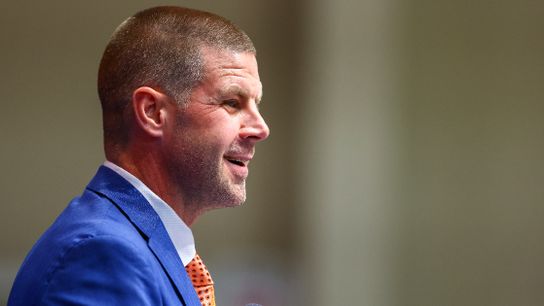The most anticipated SEC spring meetings of all-time are underway in Destin, and while most attendees are chasing the Jimbo v. Saban story or getting coaches' opinions on their preferred scheduling format, the most interesting news item slipped by most of the public unnoticed.
Billy Napier, attending his first official SEC function ahead of his first season as Florida's head coach, joined Lane Kiffin in arguing players should be paid.
"If you go back to 1990 -- I did some research the other day -- each SEC institution got like $1.3 million a year from the league. Just 13 years ago I think it was right around $6 or $7 million. I think this (new TV contract) is in the high 60s, low 70s," Napier said.
Napier is referring to the 10-year deal the SEC signed that will grant ESPN the right to broadcast all SEC games, beginning in 2024. With the move, the 3:30 p.m. ET/2:30 p.m. CT "Game of the Week" will move from CBS to ABC, which is expected to increase the per-school payout to $68 million.
That deal was announced in December 2020, seven months before the SEC added two of the biggest brands in college athletics in Texas and Oklahoma. In addition to gaining the rights to the Longhorns' and Sooners' games, expansion to 16 teams will also trigger a change to the league's scheduling format -- increasing the inventory from 57 SEC v. SEC games per year to 73, and potentially as many as 79. That could increase the value of the new contract.
The $68 million projection also doesn't include monies from the anticipated expansion of the College Football Playoff. In March, Navigate Research projected the SEC's per-school payouts to surpass $100 million by the end of this decade.
“It’s foolish to think the players don’t deserve a piece of the pie,” Napier said. “If there’s no players in these stadiums, no one is showing up to watch and they’re certainly not sitting in their home watching it on TV. It all leads back to the money. TV industry holds the key to the castle so to speak.”
I’m finding that the amount a coach complains about NIL is inversely proportional to the amount of time left in his working life. Billy Napier is 42. He’s got a looooong time left to work. pic.twitter.com/PWVrlUzL4y
— Andy Staples (@Andy_Staples) May 31, 2022
We didn't get a detailed, point-by-point list of how he'd split the pie between the conferences and a hypothetical players union, nor how such an arrangement would comply with Title IX. But that's not the point. Such details will be worked out well above his head, if and when they ever become a reality.
Less than a year into the college sports' NIL era, we now have two SEC coaches coming out and saying the industry should go all the way and cut the players in on TV deals.
